Have you lost friends because of your sense of humor?
[laughs] Probably.
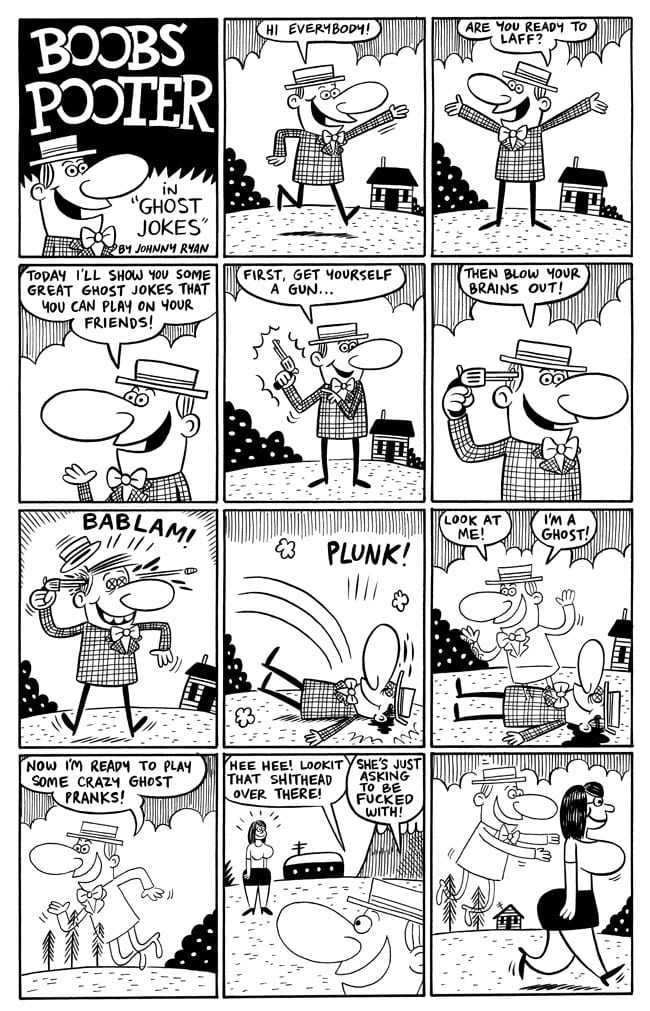
You wonder why someone doesn’t call anymore and it might be because of a Boobs Pooter cartoon or something.
Oh yeah. And then there are friends that I probably still have but we’re not as close as we used to be. It’s not like they totally cut me off, but they start to keep me at a distance or they start to keep their personal life completely secret from me. [laughs] They won’t tell me things because I’ll fucking, you know, put it right back in their face.
Has Fantagraphics ever balked at anything you’ve wanted to put out?
No, never. They’ve been really good. There’s never been anything I’ve done that they were like, “We can’t do this.” Oh, except there was one thing. The original title of my book Triple X Scumbag Party was Let’s Be Assholes. Fantagraphics sort of passed the buck and said, “Well, Norton’s not going to let us do that.” So I was like, “Ok, whatever.” Then I recently noticed that they’re publishing a cartoonist—Tim Kreider—who just did a book for them called Twilight of the Assholes.
Interesting. They’ve loosened the asshole policy.
[laughs] Yeah, I guess so.
A lot of people are surprised when they hear that you did so many one-panel gags for Nickelodeon magazine.
But I didn’t see it as too different from what my adult stuff is. The sensibilites are the same. It was just different content. I’ve said it before, but instead of rape and cock and murder, it was pizza and boogers and kangaroos. They both have that nonsensical sensibility to them. I’ve done stuff for MAD and that was harder because it was sort of like trying to walk the line between keeping it safe for families but giving it a little bit of an edge so it’s not too dopey for older kids. It’s more difficult to do that successfully in these times, when kids can watch South Park and all that shit on TV.
Do you think it’s easier to get a laugh when you rely on shock value?
Yeah, but… shock value is often used as a pejorative. I think that shock can work and it can be a lot of fun. I’m emulating stuff that I like to see and read. I like to be shocked. I like to watch a movie and see something that totally fucking blows my mind or makes me want to vomit with rage. [laughs] So, yeah, I like to shock. But to maintain that level of anger all the time is impossible.

There’s a gag panel of yours that I love, but I’ve shown it to multiple people who are totally perplexed by it because it’s so angry. It’s a soldier torturing a Middle Eastern man and the soldier is saying, “Whoa, whoa. That’s too much information!” And the Arabic guy, he’s been beaten nearly to death and is covered in blood and shit.
Right, yeah. That was a classic. [laughs]
Or there’s your seemingly bottomless well of 9-11 jokes.
I personally appreciate humor that comes from an angry place, so that’s what I try to do. It doesn’t necessarily mean all of it comes from there, but I think a lot of my quality stuff does.
When you draw something like 69-11, how much do you think about the motivations behind it?
If I come up with an idea that makes me think, “This is going to fucking piss people off,” it excites me. I don’t know what it is, but irritating people is fun. [laughs] It’s fun to hit those targets that are sacred or that are so innocent. People are like, “Why are you picking on this person?”
Give me an example of that.
There’s that story I did that’s called “The Day The New Yorker Came To Town.”
The one where the New Yorker magazine is this anthropomorphized little character and a bunch of comics artists eat its shit, give it blowjobs, and let it fuck them in the ass. It cums in the faces of Art Spiegelman, Chris Ware, and Adrian Tomine.
Yeah. None of those people in there really deserve that abuse. Just like a lot of my Comic Book Holocaust stuff—a lot of those artists don’t necessarily need to be abused in that way. All they’re doing is drawing comics. It’s not like they’re some corporate asshole leeching off the American public or murdering people or something. But there’s still something fun about abusing them.
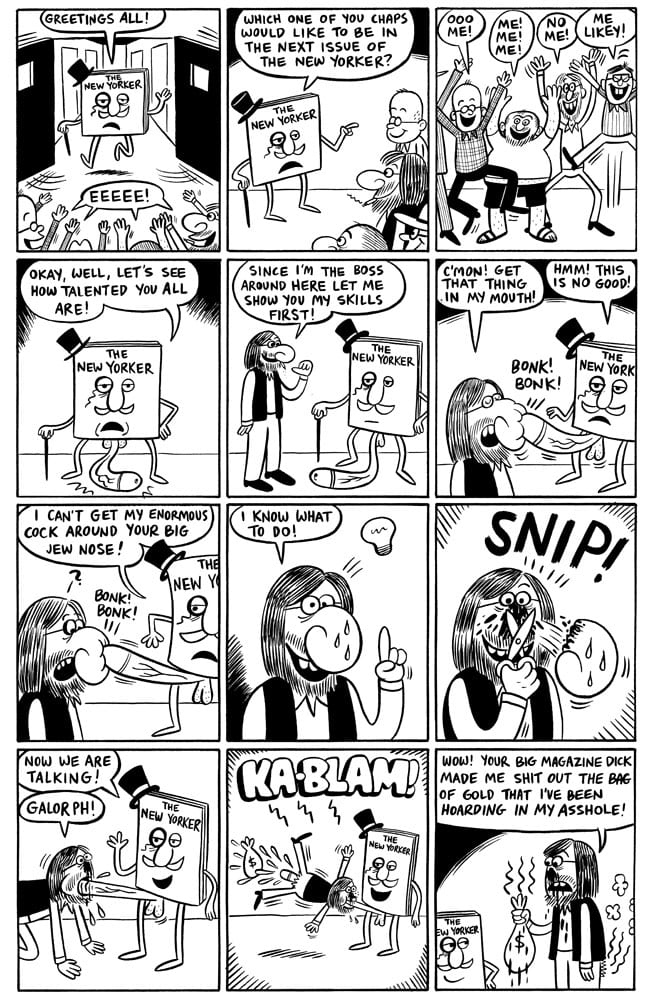
With your stories like that New Yorker one—aside from the fact that it’s funny—you’re poking at the sanctimony that gets built up around these artists by fans and editors. Maybe it’s more like you’re attacking the public perception of them and not them as people.
They’re not sacred institutions. They’re just other cartoonists. Plus I have this bullying streak in me. I don’t know what that is.
What was the one you sent me once that never ran anywhere? You said it was too much. It was a story with Clowes and one of the Hernandez brothers coming to a house for a party or something like that. Do you know what I’m talking about?
Oh yeah, that was just in my sketchbook.
What was the plot of that one?
It was right when Dan Clowes started working for the New York Times. He was running Mr. Wonderful in their Sunday magazine. And the comic you’re talking about now was sort of the same riff as that New Yorker one we just covered. Basically an anthropomorphized New York Times has a sexual, rape-y thing with Dan Clowes.
And Jaime Hernandez is in it, and someone else. Who was it?
I think Chris Ware might have made a star appearance. [laughs] But yeah, I didn’t publish that anywhere.
Why not?
I guess because I like Dan too much. That’s what it comes down to. I sent him a version of it to look at.
What did he say?
I can’t remember exactly what he said. He seemed to think it was amusing, I guess. But then I was hearing from other people that he was pissed. [laughs]
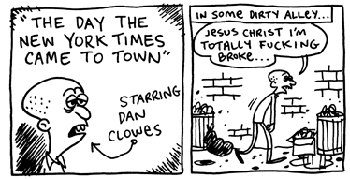
Didn’t you have Jaime Hernandez wearing a sombrero and a poncho in it?
Probably. [laughs]
Are you friends with him?
I’m friendly with him, yeah. He’s a really nice guy. You know, I think there are some people that get it—that this is comics and I’m just makin’ fun and stuff. And in a way that’s how I gauge the people that I’m friends with. A lot of the people that are in the Comic Book Holocaust books that I poke fun at are people that I’m friendly with. Then there are some that I don’t even really know. I probably met them once, maybe not at all. I’ll probably never hear from them again, or hear from them ever.
You’ve alienated Kaz, right?
Um...
With that page you did where he abandons New York for Los Angeles and then he gets fucked in every hole by an (again) anthropomorphized Cartoon Network. Then his girlfriend shows up, and his girlfriend is Art Spiegelman.
Kaz was always very nice to me, very helpful and supportive. Then I did that strip and he just fucking… it was over. When I see him, we’re friendly to each other. But I never hear from him anymore. He’s legitimately pissed.
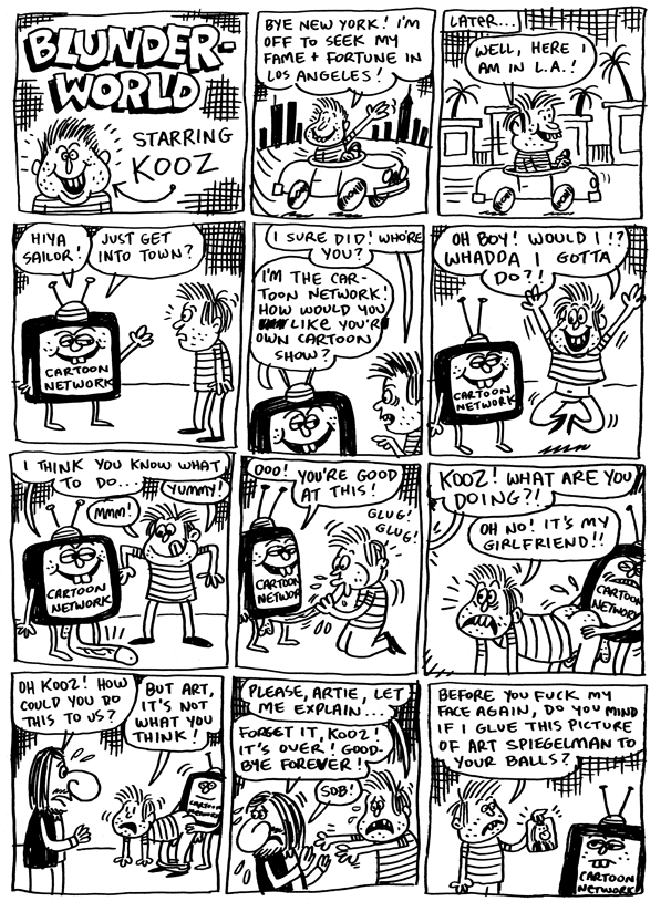
Does the thought of running into disgruntled comics artists worry you?
You just have to not give a shit whether or not these people like you.
Tell me some names of people who didn’t-like-you-in-the-first-place-so-who-gives-a-shit.
I can’t say for sure how they feel about me, but I never got the feeling that I was to Chris Ware’s liking, or Art Spiegelman. I know for a fact that Robert Crumb doesn’t like my stuff.
But didn’t he give you a blurb for one of your books?
It wasn’t a blurb. He sent me a letter. It was a weird one. I actually had to ask other people what they thought of it. He sounded like he was trying to be funny but at the same time calling me an idiot. I just assumed that he was being funny. But since then, I’ve heard from people who’ve talked to him that he doesn’t like my stuff at all.
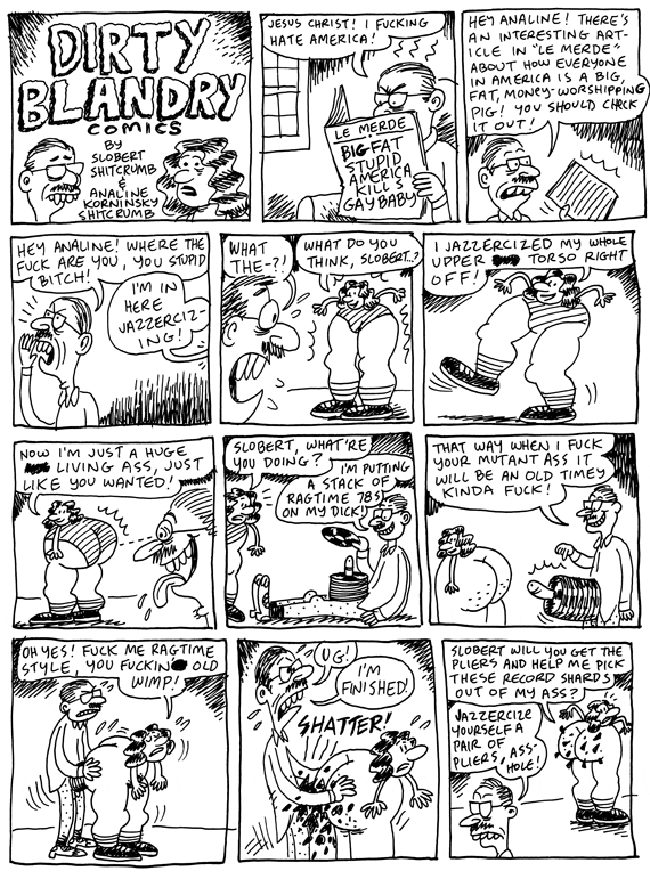
Your parodies of other comics are in the linage of MAD’s movie parodies, which everybody claims were these huge inspirations on them. MAD used to parody every movie, good and bad. It didn’t have to be bad for them to do a vicious parody of it.
And that’s what’s funny. It would be The Crockford Files one month, and then in the next issue you’d see a picture of James Garner laughing and reading it. It’s weird that a lot of people hold that Harvey Kurtzman/MAD ideal up, but nobody really follows through with it. Nobody really grasped the concept of it. Instead they’re thinking, “As long as people make fun of other stuff but not me, that’s fine.”
While the whole idea is that anything is fair game. What do you think about being part of the indie comics world? Is there a sense of community for you with specific artists?
You mean am I friendly with other comics artists? Yeah. I live pretty close to Jordan Crane and Steven Weissman, so I see them fairly often. You mentioned Jaime—I see him every once in a while. That’s all I can think of right now.
Last time you were here in New York and we were at that bar with Sammy [Harkham] and Jordan and Kevin Huizenga, I was just basically hanging back and listening to you guys gab about comics. It was like Gossip Girl but for alternative comics artists.
[laughs] What were we talking about? Do you remember?
To be honest, it got kind of boring because I don’t know half the people who were coming up. You all were like, “This guy’s work is terrible, and this other guy is doing great right now.”
That sounds like Sammy was monopolizing the conversation.
[laughs] I don’t know, you and Jordan were getting into it too. Huizenga, who I was meeting for the first time that day, was relatively quiet. But when you see these guys, do you always talk about comics?
I guess so. Sammy’s a lot more gregarious than me, and he’s also very opinionated. I think because he works on Kramers Ergot, he’s always exposed to what’s new. He seems more in-tune. I try to keep up, but I sometimes fall behind.
Can you tell me any jokes you’ve written where you had to later censor yourself because you felt like it would be too much?
I don’t do it too often. I think that when somebody tells me something or I happen to hear something that’s really personal, I wouldn’t want to make a comic exposing that. Unless it was common knowledge. I rip on people—other cartoonists or whatever—but I don’t think it really gets, not to my recollection, personal. It’s just about their work.
It’s parody, or at least a form of parody.
It’s just me commenting on what they’re putting out there.
(Continued)






